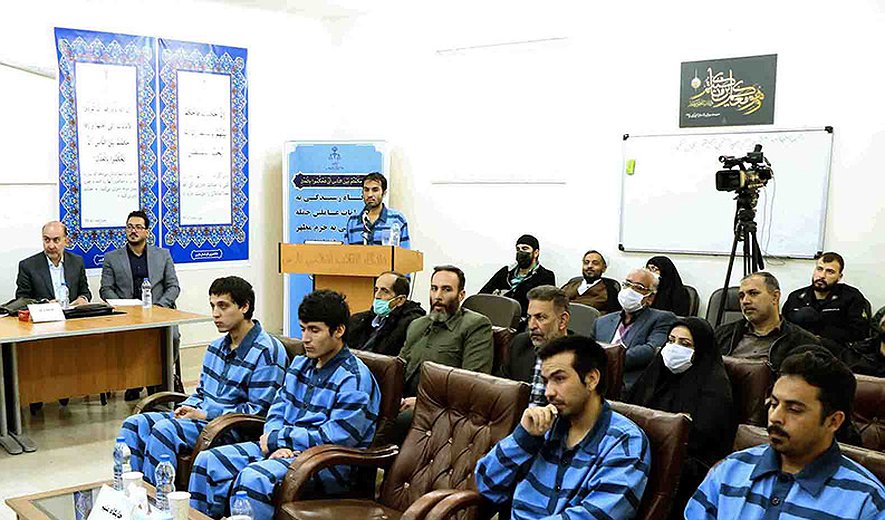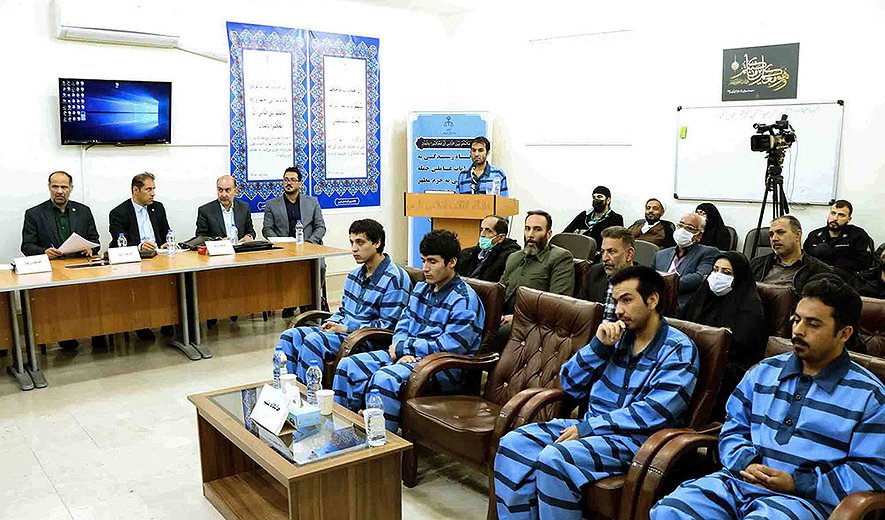Afghan Nationals Mohammad Ramez Rashidi and Naeim Hashem Ghotali Publicly Hanged

Iran Human Rights (IHRNGO); July 8, 2023: State media have reported the public executions of Afghan nationals, Mohammad Ramez Rashidi and Naeim Hashem Ghotali for charges of efsad-fil-arz (corruption on earth) and baghy (armed rebellion).
Condemning their executions after grossly unfair trials, Iran Human Rights calls on the international community to do everything in their power to stop the Islamic Republic’s killing machine.
Director, Mahmood Amiry-Moghaddam said: “As well as creating fear, the purpose of the hasty public executions of Mohammad Ramez Rashidi and Naeim Hashem Ghotali after torture-tainted forced confessions and grossly unfair trials, is to prevent clarity about the role of the Islamic Republic’s oppressive forces in the Shahcheragh terrorist attack. Islamic Republic authorities, In particular Ali Khamenei, must be held accountable for these crimes.”
Today’s executions bring the number of public executions to four and total 2023 executions to at least 369 people.
According to the Judiciary’s Mizan news agency, two Afghan men were publicly hanged in Shiraz on 8 July. Mohammad Ramez Rashidi and Naeim Hashem Ghotali were sentenced to death for charges of efsad-fil-arz (corruption on earth) and baghy (armed rebellion) in relation to the terrorist attack on the Shahcheragh shrine without due process or fair trials. They were hanged on a street near the Shahcheragh shrine, per the official report.
Iran Human Rights called on the international community to do everything in their powers to stop their executions after the Fars Chief Justice warned of their imminent execution on 6 July.
Mohammad and Naeim were sentenced to public executions without due process and after grossly unfair trials where no evidence was presented against them. The forced confessions of Mohammad Ramez Rashidi were aired prior to any legal proceedings. After the confirmation of their sentences on 21 May, Iran Human Rights called for practical punitive measures in order to stop the Iranian authorities’ killing machine.
On 15 February, the Judiciary’s Mizan news agency reported that Afghan nationals Mohammad Ramez Rashidi and Naeim Hashem Ghotali were sentenced to death for charges of efsad-fil-arz (corruption on earth), baghy (armed rebellion) and action against national security by Branch One of the Shiraz Revolutionary Court. Their sentence was upheld on 21 May.
Background:
On 26 October 2022, Iranian state media reported a terrorist attack on a shrine called “Shahcheragh” in Shiraz which they claimed the protests had paved the way for. Shortly after, they claimed ISIS was responsible for the attack. In the published video footage of the attack, one shooter was identified as a lone wolf. According to the authorities, he was injured at the scene and later died of his injuries in hospital. However there are discrepancies about the shooter’s identity and nationality. Days later, official sources reported the arrest of six others. Mohammad Ramez Rashidi’s torture-tainted forced confessions were first aired on 2 November but he could not be identified in any of the videos aired as evidence of his involvement. In a documentary named “For ISIS,” which was aired on 9 December, Mohammad’s forced confessions were aired along with three Tajik nationals, one Uzbek and an Azeri national.
However, when the trial was reported on 15 February, Mohammad Ramez Rashidi was the only defendant from the documentary, and his co-defendants were all Afghan nationals. Of the five, Mohammad Ramez Rashidi, the first defendant, and Naeim Hashem Ghotali, the third defendant, received death sentences. They were denied due process and fair trial rights by the Revolutionary Court and their forced confessions used as proof of guilt. There is no information available about the men prior to their arrests.
The two men were tried along with three other Afghan nationals in the “Shahcheragh” case. Mohammad Rahmani was sentenced to 25 years imprisonment, Mostafa Jan Amani to 15 years and Hamid Ala Kaboli to five years.
On 12 May, Iran Human Rights warned of the imminent execution of 12 political prisoners including Mohammad Ramez Rashidi and Naeim Hashem Ghotali. Three others were executed on 19 May.
It is important to note that Afghan nationals constitute the largest group of non-Iranian executions and death row cases in Iranian prisons. In 2021, no execution of Afghan nationals was recorded until September, when five men were executed in the space of 35 days. On 10 October 2021, Iran Human Rights expressed its concern that the Taliban takeover in August had facilitated the execution of Afghan nationals. That number more than tripled in 2022, with 16 Afghan nationals including a juvenile offender and a woman executed. At least eight Afghans have been executed in 2023 so far, with four executed in May.


